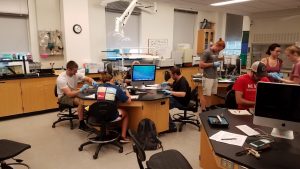I have committed to being the most effective teacher I can be by spending time in practice, and by completing over 100 hours of training to earn a Certificate in Teaching and Communication (earned May 2019). During this training, I learned and practiced strategies for surviving the first day of class, developing effective learning outcomes, engaging with diverse learning styles, managing conflict in the classroom, and structuring content, among other helpful workshops and experiences.

Students in Biology of Fishes lab conducting a dissection to learn about internal anatomy.
In addition to developing goals for my students (see Teaching Statement), I take very seriously my personal commitment and responsibility to foster equity and inclusiveness the classroom. I have been teaching in some form or fashion since my early years as a young US Marine, giving what we called ‘periods of instruction’ to peers on various topics. From those days, and my years moonlighting as a yoga instructor after my wildlife consulting day job, to my current experience in ecological disciplines of academia, the common thread for creating equity and inclusion in any learning environment has been to offer transparent communication for clarity and accessibility of both the expectations and the material. In the university classroom, this is especially important for nurturing success in traditionally under-served students.
Some practices I’ve learned for transparent course design to help all students succeed are: creating specific, straightforward, and measurable learning outcomes; communicating expectations using a rubric and examples of good work; and employing Transparency in Learning and Teaching (TILT) methods for ensuring clarity of assignments. The TILT framework requires the instructor to be explicit about communicating an assignment’s purpose, the task, and criteria. For developing effective content that truly meets course goals, I have benefited from learning and practicing backward design techniques.
Highlights of my academic teaching experience are listed below. For more on my teaching philosophy and goals for students, please see my Teaching Statement.
COURSES TAUGHT
Freshwater Ecology Laboratory (AEC 419/519). Fall 2016. Graduate Teaching Assistant. Department of Applied Ecology, North Carolina State University, Raleigh, NC. I taught the lab section of this course along with of Dr. Brad Taylor, my teaching mentor, who offered the course lecture. As a field based lab course, using a co-teaching approach was valuable for some of the labs to ensure accountability for logistics, students, and equipment. From this experience, I learned good practices about explicitly connecting lecture topics with lab activities, structuring labs to build toward larger ecological concepts, and communicating expectations and tasks clearly through detailed materials and instructions.
Biology of Fishes Laboratory (AEC 442). Fall 2016. Graduate Teaching Assistant. Department of Applied Ecology, North Carolina State University, Raleigh, NC. After a long hiatus in this course offering and the companion lecture (AEC 441), I revived the laboratory section of this course. Using the syllabus provided by my teaching mentor (Dr. Benjamin Reading, who taught the lecture), I created and shared introductory material for each lab, and designed quizzes, practicals, and bonus information, that subsequent TAs have used since my class. I learned good traits from Dr. Reading about being accessible, receptive, and relatable to students, and effective strategies for analyzing test results to identify areas where our teaching could be improved.
Introduction to Ecology (BO 360). Fall 2003. Assistant TA. Department of Zoology, North Carolina State University, Raleigh, NC. As a senior undergraduate, I assisted the graduate TA in lab prep and field exercises with students. I also had the opportunity to lead a lab during the semester. This experience was helpful in my development as a teacher.
COURSES DEVELOPED
Ecosystem Services for Ecologists. I developed this course using backward design techniques and incorporating active learning strategies as part of fulfilling the requirements of the Certificate in Teaching and Communication, North Carolina State University, Raleigh, NC. Please visit the course webpage for more information, including a course description and learning outcomes, materials and assessment, schedule and syllabus.
GUEST LECTURES
North American Freshwater Mussel Diversity and Ecology. October 2018. Freshwater Ecology (AEC 419). Guest Lecturer. North Carolina State University. Raleigh, NC.
Freshwater Mussels: Diversity, Ecology, and Threats. October 2016. Freshwater Ecology (AEC 419/519). Guest Lecturer. North Carolina State University, Raleigh, NC.
Graduate School. June 2014. Fisheries, Wildlife, and Conservation Biology Summer Camp (FW 312). Guest Lecturer. Camp Slocum, North Carolina State University, Durham County, NC.
Graduate School. June 2013. Fisheries, Wildlife, and Conservation Biology Summer Camp (FW 312). Guest Lecturer. Camp Slocum, North Carolina State University, Durham County, NC.
MENTORING
-
-
- Clayton Lynch. 2018-present. Undergraduate Research Technician.
- Meredith Shehdan. 2018-present. Research Technician.
- William (Bobby) Cope. 2011-2012. Undergraduate Research Technician.
- Angela White. 2011-2012. Undergraduate Research Technician.
-